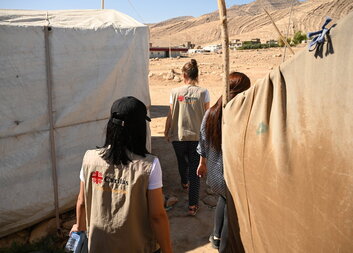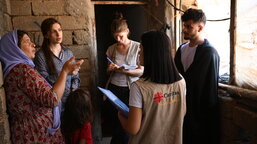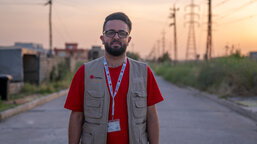Humanitarian workers are crucial in dealing with a wide range of crises around the world, whether it is fires, earthquakes, floods or wars and conflicts. Their work ensures that aid reaches those most in need. Did you know that the vast majority of aid workers are local people? Or that humanitarian work involves a lot of desk time? Read about other interesting aspects of the profession.
1. Majority of humanitarians are locals
Although there is an extensive network for international aid in crisis situations, the largest number of aid workers are local people. They are the ones who know the local conditions best, who know where to turn in a given situation and who needs their help the most. Locals also have the advantage of knowing the language and culture. And of course, they are the first on the ground, so there is no need to arrange the necessary visas or vaccinations or buy plane tickets.
Knowledge of the local communities is essential when providing humanitarian aid. It is good to know how life works in the area, but also, for example, where the market is or where important events are taking place. This makes it easier to deliver aid exactly where it will do the most good.
2. Humanitarians can work in places of crisis sites for long periods of time
We often associate the work of humanitarians with acute hazards and disasters that need to be addressed urgently. Whether it is natural disasters or war, the work needed in the public eye takes only a few days or weeks.
Once the biggest crisis is over, there is a gradual shift from humanitarian aid to development aid. The aim is to help vulnerable people to become self-sufficient. This is also how Caritas Czech Republic works. In Zambia, for example, we help refugees in Zambia to achieve higher education and learn a trade, and in Iraq we support locals after the war to rebuild their small businesses or farms.
3. The basis of humanitarian work is respect
Humanitarian aid must always be accompanied by the principles of humanity, neutrality, impartiality and independence. In practice, this means that aid workers address human suffering wherever it is found with particular attention to the most vulnerable, they respect local customs, provide needs-based assistance without discrimination, take no side in an armed conflict or other dispute.
Many aid workers would rather bite their tongue than express their own opinion on what is happening around them at any given moment. Public criticism of local conditions or blame-casting is strictly forbidden, primarily because of the risk to humanitarians, which can lead to a limitation in the provision of aid to those in urgent need in the midst of conflict.
4. The work of humanitarians is psychologically demanding
In addition to physical discomfort, aid workers must also expect a high level of psychological discomfort and long-term stress. Professional aid workers undergo psychological training to learn how to intervene in crisis situations or how to deal with people in psychologically challenging situations.
Seeing the suffering of others with one's own eyes is not easy, and so it is also true in humanitarian aid that one should first help oneself in order to be able to help others effectively.
5. Aid workers are professionals
Despite misconceptions, aid workers are not enthusiasts who travel abroad to save the world in their spare time and without experience. Humanitarians are first and foremost professionals who have been in their field for a long time. Humanitarian work requires professional experience, mental and physical resilience, as well as the necessary material and personnel resources. It is important that aid is strategically organised and structured. This makes it possible to provide help effectively. Inexperienced enthusiasts who decide they want to help and fly to the other side of the world without the necessary knowledge may end up doing more harm than good.
Humanitarian work in an international context is even the subject of study programmes at universities, where students participate in, for example, stress training or a compulsory internship abroad. Volunteers are also important in the field of humanitarian aid, but instead of travelling unorganised to crisis sites, they can get involved in the organisation's activities directly from its centre and help with administration or, for example, the preparation of communication materials. Alternatively, they can travel to do an internship with a reputable organisation, which is certainly better than setting out to help on their own.
6. Humanitarian workers spend a lot of time at their desks
Working in the field is only one part of humanitarian aid. Another important aspect is administration, such as writing projects, grant applications or evaluating activities. Not forgetting maintaining relationships with local officials or communicating with donors. A desk, a computer and a telephone are therefore part of the basic and essential equipment of a humanitarian worker.
19th of August marks World Humanitarian Day. This date commemorates the day in 2003 when 22 aid workers, including the UN's chief representative in Iraq, were killed in a bombing of a hotel in Baghdad.
We would like to dedicate this year's World Humanitarian Day to our colleagues from Caritas Jerusalem and all humanitarian workers who have been tirelessly helping in Gaza, despite being affected by the war themselves.














